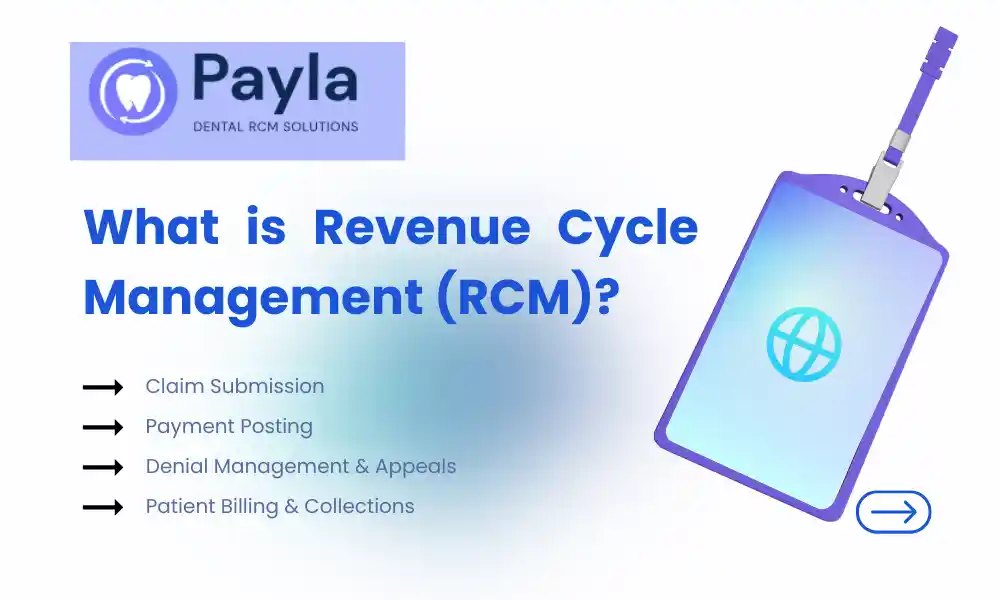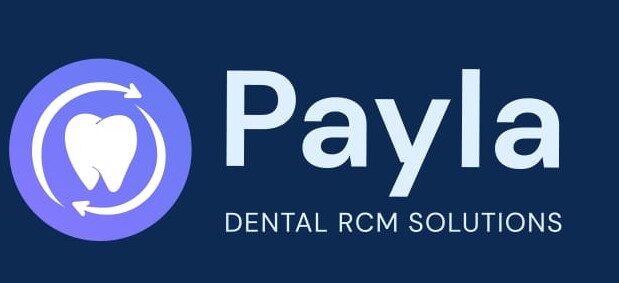Managing the financial health of a dental practice goes far beyond providing excellent clinical careit starts the moment a patient schedules an appointment and continues until the final payment is collected. This entire process is known as Revenue Cycle Management (RCM).
Where claim denials, delayed reimbursements, and patient billing issues are common, effective RCM has become more essential than ever. Without a streamlined revenue cycle, even the busiest practices can suffer from cash flow problems.
Did you know? Nearly 25% of dental claims are initially denied due to administrative errors, incorrect coding, or lack of verification costing practices thousands of dollars in revenue annually.
In this article, we’ll explore what RCM truly means for dental practices, why it’s vital to your business success, and how you can optimize it for maximum profitability.
What is Revenue Cycle Management (RCM)?
Revenue Cycle Management (RCM) is the administrative and financial process that healthcare and dental practices use to track patient care episodes from initial appointment scheduling to final payment collection. In simple terms, it’s how your practice manages everything related to billing, claims, and revenue generation.
For dental practices, RCM is more than just billing; it’s a step-by-step workflow that ensures services provided are properly documented, coded, billed, and reimbursed. When done effectively, it reduces payment delays, minimizes claim denials, and improves your overall financial performance.
Stages of the Dental RCM Process:
Patient Registration & Insurance Verification
Collecting accurate patient information and confirming insurance eligibility.
Treatment Planning & Dental Coding (CDT Codes)
Assigning appropriate dental procedure codes to ensure proper billing.
Claim Submission
Sending claims to insurance providers for reimbursement.
Payment Posting
Recording payments received and updating patient accounts.
Denial Management & Appeals
Reviewing rejected claims, correcting errors, and resubmitting.
Patient Billing & Collections
Invoicing patients for any balance due after insurance payment.
Why RCM is Essential for Dental Practices
An efficient Revenue Cycle Management (RCM) system isn’t just a financial tool—it’s a strategic foundation for running a successful and sustainable dental practice. Here’s why RCM is absolutely essential:
1. Improves Cash Flow & Reduces Revenue Leakage
By ensuring accurate patient data, timely claim submissions, and consistent follow-ups, RCM helps maintain a steady cash flow. Practices with poor RCM often leave money on the table due to missed claims or uncollected balances.
2. Minimizes Claim Denials and Billing Errors
RCM processes include verifying insurance coverage, using correct CDT codes, and double-checking claims before submission. This drastically reduces the chances of claim denials, delays, and costly billing mistakes.
3. Enhances Patient Satisfaction Through Smoother Billing
Transparent billing and faster insurance processing reduce confusion for patients. When patients receive clear, accurate bills and experience fewer delays, it improves their trust and overall satisfaction with your practice.
4. Helps in Scaling Operations Efficiently
As your practice grows, managing appointments, claims, and payments manually becomes unsustainable. A solid RCM system provides automation, reporting, and scalability making it easier to expand without sacrificing control over revenue.
Benefits of Outsourcing RCM for Dentists
Managing revenue cycle tasks in-house can become overwhelming, especially for small to mid-sized dental practices. That’s where outsourcing RCM to specialized providers offers a powerful advantage:
1. Access to Experienced Billing Professionals
Outsourcing connects you with RCM experts who stay updated with the latest CDT codes, compliance rules, and insurance policies. Their expertise helps minimize errors and ensure every claim is submitted correctly the first time.
2. Reduced Administrative Burden
Free your front desk and office staff from time-consuming billing tasks. Outsourcing allows your team to focus more on patient care, appointment scheduling, and practice growth rather than paperwork and follow-ups.
3. Faster Claim Processing & Higher Reimbursements
Outsourced RCM providers use efficient systems and proven workflows to speed up claim submissions, reduce rejections, and follow up on unpaid claims. This leads to faster payments and improved cash flow for your practice.
Conclusion
Revenue Cycle Management (RCM) is very important in maintaining the financial health and operational efficiency of your practice. From insurance verification and accurate coding to faster reimbursements and reduced claim denials, a strong RCM system ensures that your hard work translates into steady revenue.
By understanding the RCM process and addressing its common challenges, dental practices can optimize cash flow, enhance patient satisfaction, and scale with confidence.
FAQs
What is Revenue Cycle Management (RCM) in dental practices?
RCM in dental practices refers to the entire financial process of managing patient billing, insurance claims, payments, and collections. It starts from appointment scheduling and insurance verification and ends when the patient’s balance is fully paid. The goal is to ensure accurate, timely reimbursements and steady cash flow.
Why is RCM important for dental practices?
RCM is vital because it directly affects your practice’s financial health. A well-managed revenue cycle reduces claim denials, speeds up reimbursements, minimizes billing errors, and improves patient satisfaction—all of which contribute to business growth and stability.
What are the key steps in the dental RCM process?
The dental RCM process typically includes:
- Patient registration & insurance verification
- Dental coding and documentation
- Claim submission
- Payment posting
- Denial management
- Patient billing and collections
Each step must be performed accurately to avoid revenue loss.
How does poor RCM impact dental practices?
Poor RCM can lead to delayed or denied payments, increased administrative workload, higher patient dissatisfaction, and even long-term financial instability. It often results in lost revenue due to coding errors, missed claims, or improper follow-up.
Should dental practices outsource their RCM services?
Yes, many dental practices benefit from outsourcing RCM. It reduces administrative burden, ensures compliance with current billing standards, and gives access to experts who can manage claims more efficiently—ultimately leading to faster payments and fewer errors.
What tools or software help with dental RCM?
Tools that assist with RCM include practice management software (like Dentrix, Eaglesoft, or Open Dental), insurance verification platforms, automated billing systems, and analytics dashboards for monitoring claims and revenue trends.
What’s the difference between medical and dental RCM?
While both follow similar principles, dental RCM uses CDT codes instead of ICD/CPT codes and often involves more manual processes and pre-authorizations. Dental plans also vary widely, requiring more frequent insurance verification and customized billing strategies.




